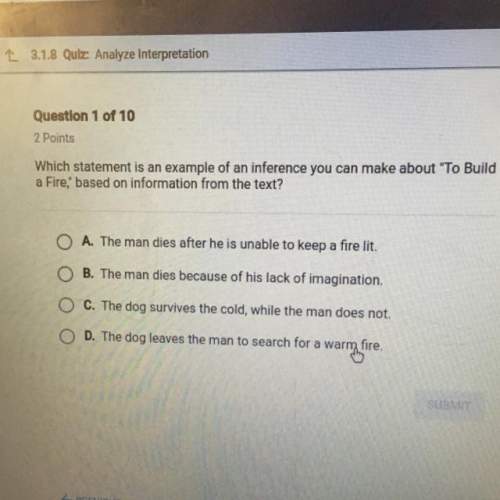
English, 21.08.2019 11:00 bellamyciana
Which sentences in these excerpts reflect the common theme of soldiers’ reluctance to talk about their war experiences? ambush by tim o'brien (excerpt) when she was nine, my daughter kathleen asked if i had ever killed anyone. she knew about the war; she knew i'd been a soldier. "you keep writing war stories," she said, "so i guess you must've killed somebody." it was a difficult moment, but i did what seemed right, which was to say, "of course not," and then to take her onto my lap and hold her for a while. someday, i hope, she'll ask again. but here i want to pretend she's a grown-up. i want to tell her exactly what happened, or what i remember happening, and then i want to say to her that as a little girl she was absolutely right. this is why i keep writing war stories: symptoms by john steinbeck (excerpt) if they had been reticent men it would have been different, but some of them were talkers and some were even boasters. they would discuss their experiences right up to the time of battle and then suddenly they wouldn't talk anymore. this was considered heroic in them. it was thought that they had seen or done was so horrible that they didn't want to bring it back to haunt them or their listeners. but many of these men had no such consideration in any other field. only recently have i found what seems to be a reasonable explanation, and the answer is simple. they did not and do not remember--and the worse the b

Answers: 2


Another question on English

English, 20.06.2019 18:04
In night chapter 2 do you think she was insane and hallucinating or having a vision of what was to come
Answers: 1

English, 21.06.2019 13:00
Hat do the words partial, palatial, and potential have in common? they have the same prefix. they have the same suffix. they have similar meanings. they have the same word root.
Answers: 1

English, 21.06.2019 18:20
Read the excerpt from act i, scene v of romeo and juliet which best describes paris's reaction when he believes that juliet has died? paris: have i thought long to see this morning's face, and doth it give me such a sight as this? o he's angry that the friar gave her poison. o he's relieved that the wedding is canceled. o he's sympathetic toward her parents. o he's devastated that he cannot marry her.
Answers: 3

English, 22.06.2019 03:30
Read this passage from an analysis essay: allegories do three things. first, they tell a story. allegories also have multiple meanings. finally, allegories offer a moral lesson. which best uses parallelism to revise this passage? a. telling a story, having multiple meanings, and moral lessons: these are the things allegories do. b. allegories, tell a story, multiple meanings, and a moral lesson. c. allegories tell a story, have multiple meanings, and offer a moral lesson. d. allegories tell a story, and have multiple meanings and offer a moral lesson.2b2t
Answers: 1
You know the right answer?
Which sentences in these excerpts reflect the common theme of soldiers’ reluctance to talk about the...
Questions

Physics, 11.11.2020 23:30


Mathematics, 11.11.2020 23:30

Mathematics, 11.11.2020 23:30

Mathematics, 11.11.2020 23:30


Chemistry, 11.11.2020 23:30

SAT, 11.11.2020 23:30

Chemistry, 11.11.2020 23:30


History, 11.11.2020 23:30



Mathematics, 11.11.2020 23:30

Mathematics, 11.11.2020 23:30

Computers and Technology, 11.11.2020 23:30







